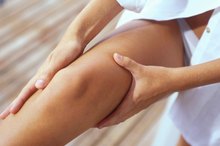Vitamins and Tight Hamstrings
The hamstrings — the group of four muscles found on the back of the thigh — are commonly affected by muscle tightness. In addition to leg pain, hamstring tightness can cause low back and sacroiliac joint pain and increase the likelihood of muscle injury during exercise. Several factors, including vitamin deficiency, contribute to hamstring tightness. By receiving the daily recommended amounts of vitamins B, C, E and D, you can help manage hamstring tightness caused by vitamin deficiency.
Vitamin D
Vitamin D is one of the most important vitamins for musculoskeletal health. Vitamin D deficiency has been linked to muscle pain and weakness and an increased rate of muscle spasms, which can contribute to muscle tightness. According to the Cleveland Clinic, vitamin D is different from other vitamins because it is a steroid hormone that helps to repair and maintain bone. It also helps the body absorb calcium, which is necessary to prevent osteoporosis, bone fractures and low bone density. Your body uses ultraviolet B found in direct sunlight to create vitamin D. For this reason, the Cleveland Clinic recommends that people receive 10 to 15 minutes of direct sunlight each day. Very little vitamin D is found in food; however, vitamin D-fortified products are available. The daily recommended amount of vitamin D for adults between the ages of 19 and 70 is 600 international units.
Vitamin E
Can Certain Vitamins Help Tight Muscles?
Learn More
Vitamin E is an antioxidant that helps to support immune function. According to the Office of Dietary Supplements, vitamin E also helps to widen blood vessels and prevent blood clots, which helps to improve circulation. This is beneficial for people with hamstring tightness because blood flow is inhibited in tight muscles, which increases muscle soreness. Food sources of vitamin E include green vegetables, such as spinach and broccoli, sunflower and safflower oils and nuts and seeds. The daily recommended amount of vitamin E for adults is 15 milligrams.
Vitamin C
Muscle damage from free radicals can lead to muscle soreness and tightness. Vitamin C is an antioxidant that helps to protect the body from damage caused by free radicals. Vitamin C also boosts immune function, improves the absorption of iron and calcium and is responsible for making collagen, which is necessary for wound healing. Citrus fruits, including oranges and grapefruits, contain the highest amounts of vitamin C. Broccoli, tomatoes, strawberries and cantaloupe also contain vitamin C in smaller amounts. The daily recommended value of vitamin C for adult males is 90 milligrams. Adult females should aim for 75 milligrams daily.
Vitamin B12
Are There Vitamins That Aid Muscle Flexibility?
Learn More
Vitamin B12 helps to prevent anemia and plays a role in ensuring nerve and blood cells are healthy. According to the Mayo Clinic, vitamin B12 deficiency can cause muscle weakness and muscle spasticity, which can contribute to muscle soreness and stiffness. If individuals are deficient in vitamin B12, their energy levels and athletic performance can also suffer. Vitamin B12 is found in animal products, including lean meat — lean beef is an especially rich source of vitamin B12 — eggs and fish. The daily recommended value of vitamin B12 is 2.4 micrograms for adults.
Precautions
Overdosing on vitamins can be as dangerous as vitamin deficiency. Certain vitamins can also interfere with medications. For this reason, it is recommended that you strive to receive the proper amounts of vitamins from food sources and only take supplements under your physician's supervision.
Related Articles
References
- Cleveland Clinic: Vitamin D Deficiency Hazardous to Athletes' Health and Performance
- Council for Responsible Nutrition: Vitamin and Mineral Recommendations
- Office of Dietary Supplements: Dietary Supplement Fact Sheet: Vitamin B12
- Office of Dietary Supplements: Dietary Supplement Fact Sheet: Vitamin C
- Office of Dietary Supplements: Dietary Supplement Fact Sheet: Vitamin D
- Office of Dietary Supplements: Dietary Supplement Fact Sheet: Vitamin E
- HealthGuidance: Home Remedies for Muscle Cramps
- Newsmax: Top 5 Health Benefits of Vitamin D
- Mayo Clinic: Vitamin B12: Evidence
Writer Bio
Tiffany Parnell is an experienced writer of health-related articles. She has worked as a copywriter in the health-care, information-technology and finance industries. Parnell holds a Bachelor of Arts in communication with a minor in biology from the University of Tennessee at Chattanooga.









